Does Labour have an anti-Semitism problem?
UK’s chief rabbi publicly criticises party over handling of the issue
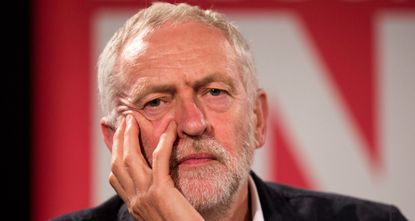
The UK’s Chief Rabbi has condemned the Labour leadership’s response to anti-Semitism accusations as “utterly inadequate”.
In an article for The Times, Ephraim Mirvis warns that “a new poison - sanctioned from the very top - has taken root” in the party, and claims “the overwhelming majority of British Jews are gripped by anxiety” over the prospect of a Labour government.
What else did the chief rabbi say?
Subscribe to The Week
Escape your echo chamber. Get the facts behind the news, plus analysis from multiple perspectives.

Sign up for The Week's Free Newsletters
From our morning news briefing to a weekly Good News Newsletter, get the best of The Week delivered directly to your inbox.
From our morning news briefing to a weekly Good News Newsletter, get the best of The Week delivered directly to your inbox.
Mirvis writes that his intervention “ranks among the most painful moments I have experienced since taking office”. But, he continues, “the way in which the leadership of the Labour Party has dealt with anti-Jewish racism is incompatible with the British values of which we are so proud - of dignity and respect for all people”.
The Jewish leader says that it is “not my place to tell any person how they should vote” but is urging the public to “vote with their conscience”.
Mirvis has been a persistent critic of Labour, reports the BBC, and celebrated Boris Johnson’s election as Tory leader in July this year. In a post on Facebook, Mirvin said: “I am delighted to congratulate Boris Johnson, a longstanding friend and champion of the Jewish community, on becoming the next leader of the Conservative Party and our next prime minister.”
How did the anti-Semitism row begin?
Since Corbyn’s election as leader, the party has been dogged by allegations and incidents of anti-Semitic conduct within its ranks.
In April 2016, Labour MP Naz Shah posted Facebook messages comparing Israel to Nazi Germany. Days later, former London mayor Ken Livingstone sparked further controversy by saying that Adolf Hitler had supported Zionism, during a BBC interview.
Then came the revelation that Corbyn had defended an anti-Semitic mural in London that the local council had wanted to remove back in 2012.
Responding to a public outcry over the various claims, Corbyn apologised for “pockets of anti-Semitism” in the party and commissioned the Chakrabarti inquiry.
This probe found that Labour was “not overrun by anti-Semitism” but did suffer from an “occasionally toxic atmosphere” and “too much clear evidence [of] ignorant attitudes”.
What has happened since?
In the aftermath of the first wave of allegations, Labour became embroiled in a row over whether to adopt the International Holocaust Remembrance Alliance (IHRA) 11-point definition of anti-Semitism. The party ultimately did so - but the controversy didn’t stop there.
Shortly before the decision was announced, leading human rights lawyer Geoffrey Robertson wrote in an opinion piece for The Times in which he argued that the IHRA definition was “not fit for the purpose and will chill legitimate criticism of the state of Israel”.
Robertson claimed that some of the 11 examples of anti-Semitism within the definition were so loosely drafted that they were “likely to deter criticism of action by the Israeli state and advocacy of sanctions as a means to deter human rights abuses in Gaza”.
That row came weeks after leaked audio emerged in which pro-Corbyn Labour veteran Peter Willsman - who swept the board in elections to the party's ruling National Executive Committee (NEC) - claimed “never to have seen” any signs of such anti-Jewish prejudice. He even suggested that the controversy had been stirred up by Israeli infiltrators.
Willsman's remarks “are particularly troubling because, like all members of the ruling executive, he sits on the disputes committee: if there is one group of people who should not be able to say with a straight face that they have never seen anti-Semitism in the Labour Party, it is the 39 members of the party's National Executive Committee”, the New Statesman’s Stephen Bush subsequently wrote.
Is the anti-Semitism controversy nearing an end?
It seems unlikely. Labour was struggling with fresh accusations of anti-Semitism prior to the chief rabbi’s intervention this week.
In May, the Equality and Human Rights Commission launched a formal investigation to determine whether Labour had “unlawfully discriminated against, harassed or victimised people because they are Jewish”.
Labour is only the second party to be investigated by the EHRC, after the British National Party. In 2010, the EHRC ordered the BNP to rewrite its constitution to comply with race relations laws after the party banned black and minority ethnic Britons from becoming members, reports The Guardian.
Labour is facing accusations of undermining the EHRC’s investigation after including a manifesto pledge to “enhance the powers and functions of the Equality and Human Rights Commission, making it truly independent”.
Jennifer Gerber, director of Labour Friends of Israel, this week said that the suggestion that the equality body was not independent was “extremely worrying”.
Corbyn insists Labour is tackling anti-Semitism by expelling members and has today launched a “race and faith manifesto” aimed at tackling prejudice.
Create an account with the same email registered to your subscription to unlock access.
Sign up for Today's Best Articles in your inbox
A free daily email with the biggest news stories of the day – and the best features from TheWeek.com
-
 Fall into the groove at these delightful record stores
Fall into the groove at these delightful record storesThe Week Recommends Each one strikes its own chord
By Catherine Garcia, The Week US Published
-
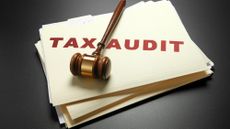 How likely are you to get audited by the IRS?
How likely are you to get audited by the IRS?The Explainer The odds are greater for some than others
By Anya Jaremko-Greenwold, The Week US Published
-
 Crossword: April 22, 2024
Crossword: April 22, 2024The Week's daily crossword
By The Week Staff Published
-
 Will Aukus pact survive a second Trump presidency?
Will Aukus pact survive a second Trump presidency?Today's Big Question US, UK and Australia seek to expand 'game-changer' defence partnership ahead of Republican's possible return to White House
By Sorcha Bradley, The Week UK Published
-
 Britain's biggest political donors
Britain's biggest political donorsThe Explainer With the 2024 general election set to be the highest-spending contest ever we look at who is giving to which party and why
By The Week UK Published
-
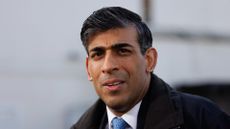 It's the economy, Sunak: has 'Rishession' halted Tory fightback?
It's the economy, Sunak: has 'Rishession' halted Tory fightback?Today's Big Question PM's pledge to deliver economic growth is 'in tatters' as stagnation and falling living standards threaten Tory election wipeout
By Harriet Marsden, The Week UK Published
-
 What will £28bn green investment U-turn cost Labour?
What will £28bn green investment U-turn cost Labour?Today's Big Question Dropping flagship pledge 'will confirm workers' scepticism of the endless promises of jam tomorrow', said union leader
By The Week UK Published
-
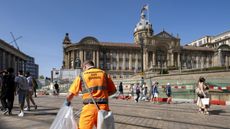 Why your local council may be going bust
Why your local council may be going bustThe Explainer Across England, local councils are suffering from grave financial problems
By The Week UK Published
-
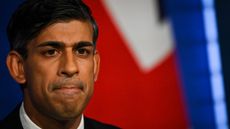 Rishi Sunak and the right-wing press: heading for divorce?
Rishi Sunak and the right-wing press: heading for divorce?Talking Point The Telegraph launches 'assault' on PM just as many Tory MPs are contemplating losing their seats
By Keumars Afifi-Sabet, The Week UK Published
-
 How many seats do Labour and the Tories need to win?
How many seats do Labour and the Tories need to win?In depth Changes to constituency boundaries mean Labour needs even bigger swing at next election to form a majority
By Sorcha Bradley, The Week UK Published
-
 How would a second Trump presidency affect Britain?
How would a second Trump presidency affect Britain?Today's Big Question Re-election of Republican frontrunner could threaten UK security, warns former head of secret service
By Harriet Marsden, The Week UK Published